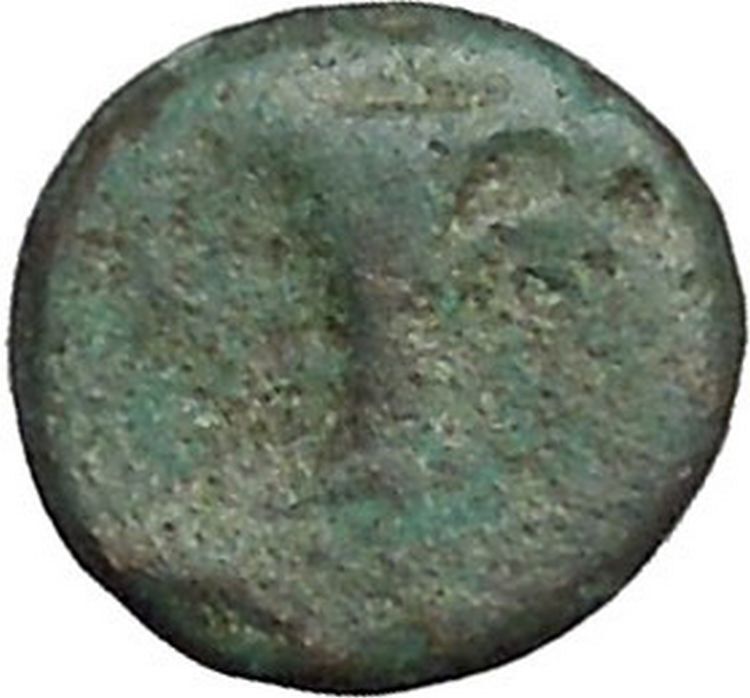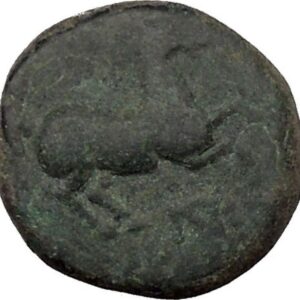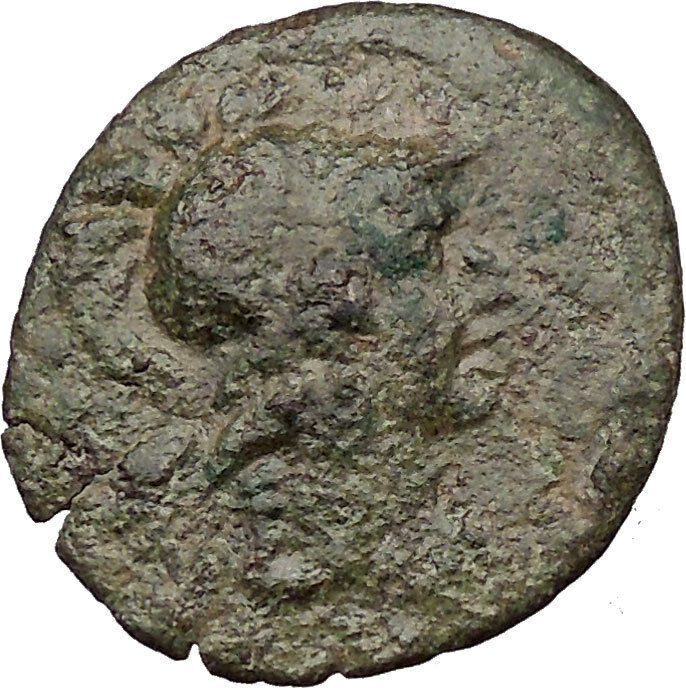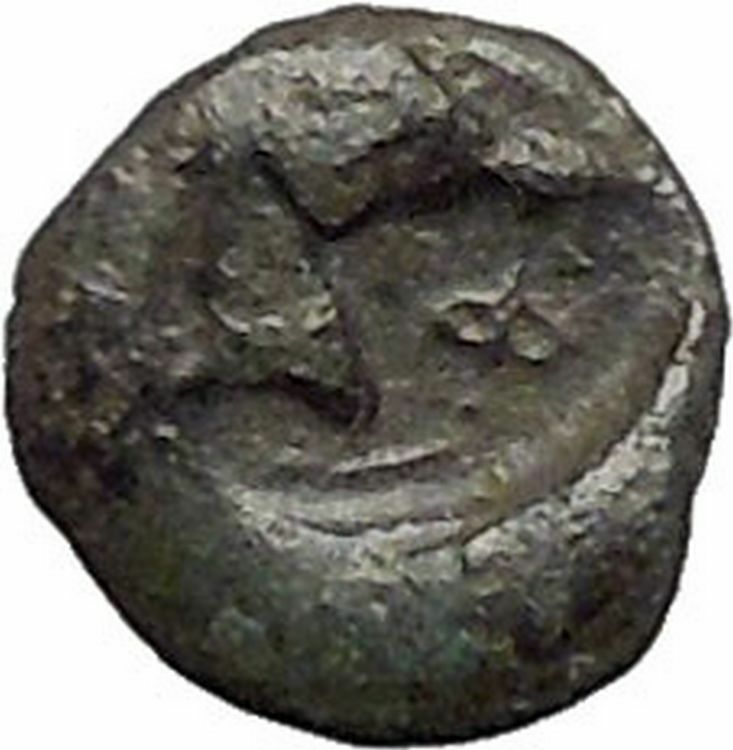|
Greek city of Antioch on the Orontes in Seleukis and Pieria
Pseudo-Autonomous Issue Time of Roman Emperor Hadrian, 117-138 A.D.
Bronze 13mm (3.20 grams) Dated CY 177, struck 128/129 A.D.
Reference: RPC III 3751; McAlee 127b
AΝΤΙΟΧΕΩΝ ΜΗΤΡΟΠΟΛЄωС Laureate and draped bust of Apollo to right.
ЄTOYC ZOP B Lyre.
Founded by Seleukos I circa 300 B.C. with Greek and Macedonian settlers brought from the destroyed city of Antigoneia on the Orontes. The city was named after Seleukos’ father with the purpose of being a western capital to guard against the northern expansion of the Ptolemaic kingdom. Eventually as many territories were lost, Antioch became the only capital of the Seleukid kingdom. Pompey the Great deposed the last king Antiochos XIII in 64 B.C. The Romans then made it a capital of a new Roman province and the seat of the Roman governors. There were temples of Olympian Zeus, Apollo in Daphne, hippodrome (built under the Seleukids and embellished by the Romans) and colonnaded main streets (being a gift from Herod the Great). It was an important center for the arts and learning.
You are bidding on the exact item pictured, provided with a Certificate of Authenticity and Lifetime Guarantee of Authenticity.
 In Greek and Roman mythology, Apollo, is one of the most important and diverse of the Olympian deities. The ideal of the kouros (a beardless youth), Apollo has been variously recognized as a god of light and the sun; truth and prophecy; archery; medicine and healing; music, poetry, and the arts; and more. Apollo is the son of Zeus and Leto, and has a twin sister, the chaste huntress Artemis. Apollo is known in Greek-influenced Etruscan mythology as Apulu. Apollo was worshiped in both ancient Greek and Roman religion, as well as in the modern Greco-Roman Neopaganism. In Greek and Roman mythology, Apollo, is one of the most important and diverse of the Olympian deities. The ideal of the kouros (a beardless youth), Apollo has been variously recognized as a god of light and the sun; truth and prophecy; archery; medicine and healing; music, poetry, and the arts; and more. Apollo is the son of Zeus and Leto, and has a twin sister, the chaste huntress Artemis. Apollo is known in Greek-influenced Etruscan mythology as Apulu. Apollo was worshiped in both ancient Greek and Roman religion, as well as in the modern Greco-Roman Neopaganism.
As the patron of Delphi (Pythian Apollo), Apollo was an oracular god – the prophetic deity of the Delphic Oracle. Medicine and healing were associated with Apollo, whether through the god himself or mediated through his son Asclepius, yet Apollo was also seen as a god who could bring ill-health and deadly plague as well as one who had the ability to cure. Amongst the god’s custodial charges, Apollo became associated with dominion over colonists, and as the patron defender of herds and flocks. As the leader of the Muses (Apollon Musagetes) and director of their choir, Apollo functioned as the patron god of music and poetry. Hermes created the lyre for him, and the instrument became a common attribute of Apollo. Hymns sung to Apollo were called paeans.
In Hellenistic times, especially during the third century BCE, as Apollo Helios he became identified among Greeks with Helios, god of the sun, and his sister Artemis similarly equated with Selene, goddess of the moon. In Latin texts, on the other hand, Joseph Fontenrose declared himself unable to find any conflation of Apollo with Sol among the Augustan poets of the first century, not even in the conjurations of Aeneas and Latinus in Aeneid XII (161-215). Apollo and Helios/Sol remained separate beings in literary and mythological texts until the third century CE.
 Hadrian – Roman Emperor: 117-138 A.D. Hadrian – Roman Emperor: 117-138 A.D.
| First-cousin-once-removed and adopted son of Trajan | Husband of Sabina | Adoptive father of Aelius and Antoninus Pius | Grand-nephew of Trajan Pater |
Publius Aelius Hadrianus (as emperor Imperator Caesar Divi Traiani filius Traianus Hadrianus Augustus, and Divus Hadrianus after his apotheosis, known as Hadrian in English; 24 January 76 – 10 July 138) was emperor of Rome from AD 117 to 138, as well as a Stoic and Epicurean philosopher. A member of the gens Aelia, Hadrian was the third of the so-called Five Good Emperors.
Hadrian was born Publius Aelius Hadrianus in Italica or, less probably, in Rome, from a well-established family which had originated in Picenum in Italy and had subsequently settled in Italica, Hispania Baetica (the republican Hispania Ulterior), near the present day location of Seville, Spain. His predecessor Trajan was a maternal cousin of Hadrian’s father. Trajan never officially designated a successor, but, according to his wife, Pompeia Plotina, Trajan named Hadrian emperor immediately before his death. Trajan’s wife was well-disposed toward Hadrian: Hadrian may well have owed his succession to her.
Hadrian’s presumed indebtedness to Plotina was widely regarded as the reason for Hadrian’s succession. However, there is evidence that he accomplished his succession on his own governing and leadership merits while Trajan was still alive. For example, between the years AD 100-108 Trajan gave several public examples of his personal favour towards Hadrian, such as betrothing him to his grandniece, Vibia Sabina, designating him quaestor Imperatoris, comes Augusti, giving him Nerva’s diamond “as hope of succession”, proposing him for consul suffectus, and other gifts and distinctions. The young Hadrian was Trajan’s only direct male family/marriage/bloodline. The support of Plotina and of L. Licinius Sura (died in AD 108) were nonetheless extremely important for Hadrian, already in this early epoch.
|





 In Greek and Roman mythology, Apollo, is one of the most important and diverse of the Olympian deities. The ideal of the kouros (a beardless youth), Apollo has been variously recognized as a god of light and the sun; truth and prophecy; archery; medicine and healing; music, poetry, and the arts; and more. Apollo is the son of Zeus and Leto, and has a twin sister, the chaste huntress Artemis. Apollo is known in Greek-influenced Etruscan mythology as Apulu. Apollo was worshiped in both ancient Greek and Roman religion, as well as in the modern Greco-Roman Neopaganism.
In Greek and Roman mythology, Apollo, is one of the most important and diverse of the Olympian deities. The ideal of the kouros (a beardless youth), Apollo has been variously recognized as a god of light and the sun; truth and prophecy; archery; medicine and healing; music, poetry, and the arts; and more. Apollo is the son of Zeus and Leto, and has a twin sister, the chaste huntress Artemis. Apollo is known in Greek-influenced Etruscan mythology as Apulu. Apollo was worshiped in both ancient Greek and Roman religion, as well as in the modern Greco-Roman Neopaganism. Hadrian – Roman Emperor: 117-138 A.D.
Hadrian – Roman Emperor: 117-138 A.D.




